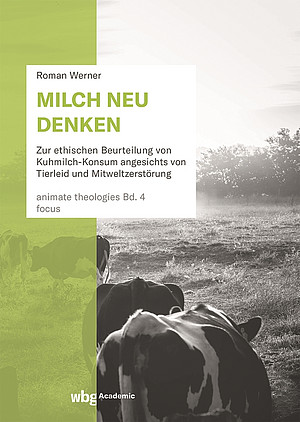
Werner: Rethinking milk
A moral appeal not to see cow's milk as a resource for humans
Milk is everywhere: in jars and cartons, on pizza, in coffee, children's drinks and cookies; praised as a quality product of local and regional agriculture, traded on the world market as a cheap raw material. Small farms are giving way to industrial production, which leaves little room for dignified animal husbandry, grazing cattle and sustainable cycles.
Animal milk on prescription instead of a watering can for all
The Graz-based animal ethicist Roman Werner formulates his argument for doing without dairy products as far as possible with academic forethought and due caution. Only in rare exceptional cases should they be produced for people who do not have access to valid alternatives. For example, infants who cannot obtain human breast milk or people whose food choices are severely restricted due to serious illnesses.
More information about the book
(Text taken from the book's publisher page)
Selected publications
In view of the increasing digitalization of our lives with regard to algorithms and socio-technical (AI) systems, (social) ethics is particularly called upon to open up perspectives on how to shape this change in a humane way. In this context, the question of the role and position of the "human factor" within these structures is becoming increasingly important. Even in the most popular sport in the world, soccer, which is otherwise so rich in tradition, technical systems (goal-line technology - GLT, video assistant referee - VAR) are increasingly being introduced and are leading to new challenges, especially in the context of refereeing decision-making processes. For this reason, this paper will focus on the relationship between humans and AI and the need for ethical and legal regulation of these systems, as well as sport ethical highlights and values and ethical principles that should open up such perspectives. Algorithms and socio-technical (AI) systems must ultimately be designed in such a way that people remain at the center.
On the way to a value system for the digital age
Big data, e-learning (also, but not only, boosted by the pandemic since 2020), the growing digital footprint in social networks, the real scenario of seamless (self-)surveillance, increasing automation in the world of work and the ongoing boom in digital end devices (including their environmental costs) are just a few examples of the rapid changes on the road to digitality. On the other hand, there is a growing unmet demand for workers, particularly in the care, service and manufacturing sectors.
In this anthology, the editors and Christian Blasge, Armin Grunwald, Theresia Heimerl, Herbert Hracovec, Katrin Otrel-Cass, Martina Schmiedhuber, Peter Strasser, Franz Winter and others address the question of how society should deal with these new challenges and the resulting uncertainties. How much digitalization and mechanization are compatible with a good life for all people and their environment? The authors state that the individual and societal need for normative orientation is growing, but that the discourse on a sustainable value system for the digital age has only just begun. Ethics and religion(s) are challenged to make a constructive contribution to this by focusing on the well-being of all people, critically questioning the paths and goals of global change and opening up and promoting perspectives for a humane shaping of the digital transformation.
A moral appeal not to see cow's milk as a resource for humans
Milk is everywhere: in jars and cartons, on pizza, in coffee, children's drinks and cookies; praised as a quality product of local and regional agriculture, traded on the world market as a cheap raw material. Small farms are giving way to industrial production, which leaves little room for dignified animal husbandry, grazing cattle and sustainable cycles.
Dietary habits and taste preferences often prevent us from recognizing the systematic animal suffering and clear environmental destruction for what they are: important reasons to reconsider our milk consumption.
Today, there is no longer no alternative to milk from grazing animals; nutrient-rich plant-based products serve as an accessible substitute and offer the possibility of a convenient switch to plants.
Animal milk on prescription instead of a watering can for all
Roman Werner, an animal ethicist from Graz, formulates his argument for avoiding dairy products as far as possible with academic forethought and due caution. Only in rare exceptional cases should they be produced for people who do not have access to valid alternatives. For example, infants who cannot obtain human breast milk or people whose diet is severely restricted due to serious illnesses.
Cattle used in such cases would have to be kept on grass and pastureland and treated with respect. This sometimes included allowing cow and calf to stay together instead of being separated for the purpose of maximizing profit. It also meant that all animals that did not (or no longer) appear profitable due to their sex or age could continue to live.
The European Commission has presented a draft for an Artificial Intelligence Act (AIA). This article deals with legal and ethical questions of the datafication of human emotions. In particular, it raises the question of how emotions are to be legally classified. In particular, the concept of "emotion recognition systems" in the sense of the draft Artificial Intelligence Act (AIA) published by the European Commission is addressed. As it turns out, the fundamental right to freedom of thought as well as the question of the common good and human dignity become relevant in this context, especially when such systems are combined with others, such as scoring models.